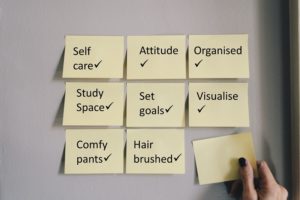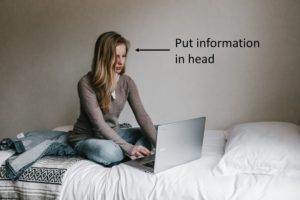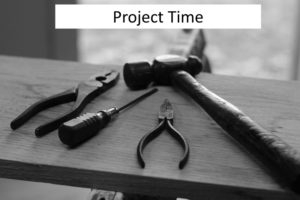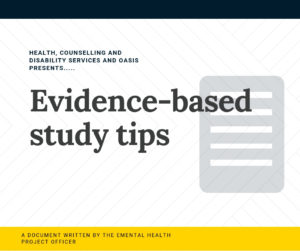
You might be aware from previous posts that we are putting together a Mental Fitness Course for 2019.
The course will consist of a series of ‘lessons’ on different mental fitness topics.
The goal is to equip students with the study and personal skills required to make the most of their time at university. For some, the course might be about improving their wellbeing – feeling happier, more connected, more engaged. For others, it might be about increasing their productivity and improving their GPA.
For those of you interested in improving your GPA and performance, one of the key topics we’ll be addressing in that course, is how to be a good student.
And by ‘good’ I don’t mean well behaved. I mean being an effective learner (i’ll leave judgements of morality to someone else :))
This morning I sat down and started mapping out the content for that lesson. As part of my commitment to blogging the development of this course, I thought I’d share the initial results of that mapping. You can also get this content as a handout – hard copies available at HCDS (Level 3, Student Centre) or online.
What does it mean to be a good student?
There are many aspects to student life, but in terms of being good academically, it is about attending lectures, participating in tutorials, doing the readings, learning the material, getting assignments in on time, studying for exams, aiming to get good grades (or improve your grades over time if you get off to a rough start), and ultimately geting a good academic transcript. Depending on your degree, there might also be work placements to attend and theses to complete (I had to do an Honours and a PhD thesis).
Central to performing well and getting good grades is studying, learning and being able to reproduce the material given to you by lecturers and tutors. The better you learn the material, the more likely you are to be able to write good assignments, perform well at exams, and have meaningful experiences on work placements.
Ok Gareth – so how do I get better at learning?
Weirdly, no-one ever taught me how to learn.I had teachers who taught me maths, english, science etc, but no-one ever sat me down and showed me how to learn material more effectively. This is a bit weird, yet I am confident that a lot of you will have had the same experience.
Mostly, there is an assumption that if you got through high school or the tertiary entrance exam process, that you have the skills required to study at a tertiary level.
But the reality is studying at a tertiary level requires more advanced study skills and if you don’t know these skills, you can make life much harder for yourself than it needs to be.
The good news? – these study skills are well known and relatively simple to understand
The bad news? – you are probably going to have to change some of your study practices
So what are those study skills? Lets break them up a little into sub-groups, so they are a bit easier to remember.

Set yourself up for success
Before you even open up your books, there are a bunch of things you can do to set yourself up as a more effective learner.
- Healthy brain – if you abuse your brain with poor sleep, poor nutrition, limited physical activity and excessive drug and alcohol use, it will not reward you with being smart and capable. Does this mean you need to be a saint? Of course not, but if you want high performance, look after that big grey lump between your ears through attending to the basics of self-care.
- Attitude – your attitude is a reflection of your beliefs. If you believe that your abilities are fixed, that study always requires motivation and confidence, and that confusion and setbacks are unbearable, well you might find your attitude towards study is quite negative. However if you acknowledge that you can always improve, that action breeds motivation and confidence and that confusion and setbacks are a normal (and useful) part of the learning process, your attitude towards study will be much more realistic and helpful.
- Get organised – this means schedules and to-do lists and all that fancy stuff that the nerdy students do. This is even more important if you have a lot of people or things demanding your time (family, work, responsibilities, other roles). Remember that a full-time degree = full-time work. You should be doing the equivalent of 7.5 hours of study per day (including lectures and tutorials). This can be a shock to the system if you’ve come from high school, because you go from a tightly controlled environment into one where your time is controlled by you, not the school. So you will have to learn to organise yourself.
- Set up a nice study space – i’ve already talked about this previously
- Set goals – and make it a nice mix of performance goals (e.g. “I want to get Credits or above for all my topics this semester”) as well as mastery goals (e.g. “I want to learn all about the different areas of the brain this semester”).
- Visualise – each day wake up and visualise the end of the semester and having done well. Also visualise the day ahead and imagine having a productive day of study, lectures and tutorials. Constantly imagine yourself as a successful student. It doesn’t magically make it happen, it just focuses your brain on the desired outcomes.

Making the most of lectures and tutorials
First – turn up at lectures and tutorials. Yes, you can get a lot of it ‘online’ after the event, but honestly, the self-discipline to rock up and attend lectures (even if that means attending them live for students who are entirely online) is a good predictor of whether you’ll do well overall.
Second – take notes, preferably hand-written notes, even if you are provided with handouts. Annotate them, add extra stuff. Just make sure you are actively trying to take the key concepts of the lecture/tutorial and writing them down. Use a defined system if it helps (e.g. Cornell note taking system).
Third – review those notes after the lecture/tutorial (perhaps a day later) and expand on them. Add content that you remember but didn’t write down at the time. Think about how what you learned in this lecture relates to previous lectures, to other related topics, maybe even to your own life.
Fourth – ask questions, inquire further. Don’t contact lecturers in the middle of the night with your crazed energy-drink ramblings, but within normal office hours, lecturers and tutors are generally happy to answer questions if you’ve engaged with the material and have some thoughtful reflections on it.

Getting all that material into your head
So you’ve got lecture notes, tutorial notes, assigned readings – all of which need to get into that big noggin of yours. Don’t worry though, your brain has enough space for it all, as long as you feed it in appropriately. Let’s take a look at how that is best done.
Reading – is good. Read each items at least 2 to 3 times – more than that has diminishing returns. During the 2nd or 3rd read you should be making notes. If you can do all of this offline (pen, paper) that would be good, but that is not always possible.
Underlining and highlighting – are fine, but they don’t really help with memorising stuff. They are simply methods to mark content that should be read again, noted, or added to a flash card.
Taking notes – is important. Use your own words to capture the key concepts. Bullet points to extract key facts/equations/dates etc. Again, if you want to use a specific system for note-taking or feel you take bad notes, try this.
Develop questions – Use your notes to develop questions that a) you can ask of lecturers or tutors, b) you can use for developing flashcards (see next point), or c) guide you in exploring the topic further.
Develop flash cards – flash cards are bite-sized chunks of information, written on cards that are ideal for learning and self-testing – http://www.learningscientists.org/blog/2016/2/20-1?rq=flashcards. You can build a set of flash cards for each chapter/paper that you read, that are built on your notes, as well as the questions you’ve developed.
Space your readings over time. Say you have a chapter to read. Instead of reading it 3 times and making notes/flashcards in a single sitting, do it over a couple of sessions. Then revisit those notes/flashcards repeatedly over the course of the semester. Regular spaced readings are better than single massed readings.
Read something from each topic everyday. Mix up your study sessions to include content from multiple topics. Being able to move from one topic to another will help you draw connections between the topics, but also train your brain to be able to move between topics with greater ease. Don’t confuse this with multi-tasking though. Only ever do one thing at a time, but divide your time between topics. For example, in a 2 hour study session, you might devote 35 minutes to 3 topics, with 5 minute breaks in between.
Attach facts to stories/worked examples/your own life – Some facts or concepts are easier to remember if you can attach them to a) worked examples, b) stories or c) your own life. Look for where you can attach a fact/concept to something more memorable.

Making sure you can get all that material out of your head
Ok – so you got all that information into your head. When exams come, you are going to need to get it out again. You’ll also have to get it out again when you start working in your profession. Its called retrieval.
The best way to improve retrieval is to practice it regularly. The more often you practice retrieving information from that brain of yours, the better you’ll get at it. Here’s how….
Time to use those flash cards – Remember those flash cards you created earlier? Now is the time to start regularly self-testing yourself using those cards. Read the questions on the one side, and try to recall the information on the other. Test yourself regularly with these cards over the course of the semester. Don’t worry about getting some wrong. Making errors is a crucial part of the retrieval practice process.
Explain things to yourself – Wait till the house is empty and you have some privacy and try explaining important concepts out loud to yourself. Imagine yourself teaching a class of peers and having to explain the concepts. If you are involved in a study group, this can actually be done for real.
Practise testing – Get hold of old exams or tests and practise taking them. It is preferable if the tests are pure recall tests, but multiple choice can still be useful.
Study location – If you are going to be tested in a familiar and accessible location, try to do some study sessions in that location. If the test location is not accessible, practise retrieving information across a range of settings. This weakens the association of the information to a single location.

Things not to do
Naturally therefore, these are the things that everyone does.
Cram – Let’s be honest, we all do this. We leave all the readings and learning to the last minute and try to do it in one caffeine fuelled blob. Look – sometimes it can be effective if you just need to retain the information for a very short period of time, but overall it is a poor method for retaining material over a longer period, and remember, beyond exams, you will need some of this material for your actual job. You can’t really afford to lose it from your brain, the second the exam is finished.
Multi-task – There is no such thing as multi-tasking. If you believe you can multi-task, then really the only talent you have is being able to switch quickly between tasks. Rapid switching between tasks consumes large amounts of mental energy and impairs performance on all tasks. Just study one thing at a time.

Embrace the social
Studying by yourself all the time can be lonely and boring (although admittedly I prefer studying alone). Some people benefit from the energy of occasionally studying with friends, which can make it more enjoyable, but also offers up learning hacks that are difficult to do on your own.
Find the smart people and start a study group – Generally you can identify the smart students. They ask interesting questions during lectures or tutorials, they seem to know the material and they appear a bit neurotic. Start a study group with these people. Not only will they push you to be better, you will learn specific techniques and ideas for how they learn.
Practise justifying and teaching concepts to a fellow student – The level of understanding required to successfully teach a concept to a fellow student suggests the material is well learned. In a study group, each select a topic or concept ahead of time, and then when you meet, try to teach each other those concepts.
Get someone else to test you on your flash cards – When they are taken out of your hands, its much harder to cheat 🙂

Find the fun
I commonly hear students describing how their studies are no longer fun and interesting. Part of this is normal and simply the reality of doing a university degree.
However if you find the fun has really disappeared from your studies, try exploring ways to add some fun to what you are learning.
Embrace the social – see the points above. Adding people to the mix can make learning more engaging. Also, study groups often become social groups.
Join a club – There is a club for everything. Clubs offer opportunities for socialising and extra-curricular projects within your area of study which can invigorate your interest in the topic.
Start a project – There is nothing stopping you doing something extra with the content you are learning. For example, you might start a blog describing your learning process (at the same time practising your writing), or make a film about some aspect of your study. Create a project that is connected to your studies, but gives you the opportunity to engage with the content in a different way.

When things don’t go well
Students commonly present to Health, Counselling and Disability services feeling ashamed that they’ve succumbed to procrastination (putting assignments off) or perfectionism (unrelenting excessive self-standards). What they don’t often realise is how common these problems are, and that any of us (students or staff) can fall prey to them.
If you feel like your study has gone off the rails, first extend yourself some forgiveness and self-compassion. Acknowledge that there is problem but remind yourself that such issues are common and that you will be able to get back on track. Slip-ups, errors and failures are a normal part of life, and not a sign that you are broken.
Start by looking back through this post and select a few study strategies to implement. View your studies as a bit of an experiment, where you are trying different strategies and seeing which ones work best for you. I’ve talked previously about self-experimentation. If you are having ongoing troubles, consider seeing a counsellor. Also stay tuned to this blog for more articles and programs designed to help with common issues.
Final thoughts
When we launch the Mental Fitness Course in 2019, being an effective learner will be a critical component of it. I hope this post gives you an initial look into the types of things that we will be talking about.
If you feel like reading/watching/listening more on the topic in the meantime, I can recommend the following:
- The Learning Scientists website (http://www.learningscientists.org/) developed by a team of cognitive psychological scientists interested in the science of learning.
- The Science of Learning Research Centre conducts and reports research on how to improve the learning process – https://www.slrc.org.au/
- Retrieval Practice is a website dedicated to understand how retrieval practice improves learning – https://www.retrievalpractice.org/
- College Info Geek produces a large amount of content on being a better student – https://collegeinfogeek.com/
Also if you’ve picked up some excellent study hacks along the way, feel free to share them in the comments below, or come and have a chat over at the Wellbeing for Academic Success FLO site. Students are one of my best sources for interesting and cool study hacks, so let’s share them.


